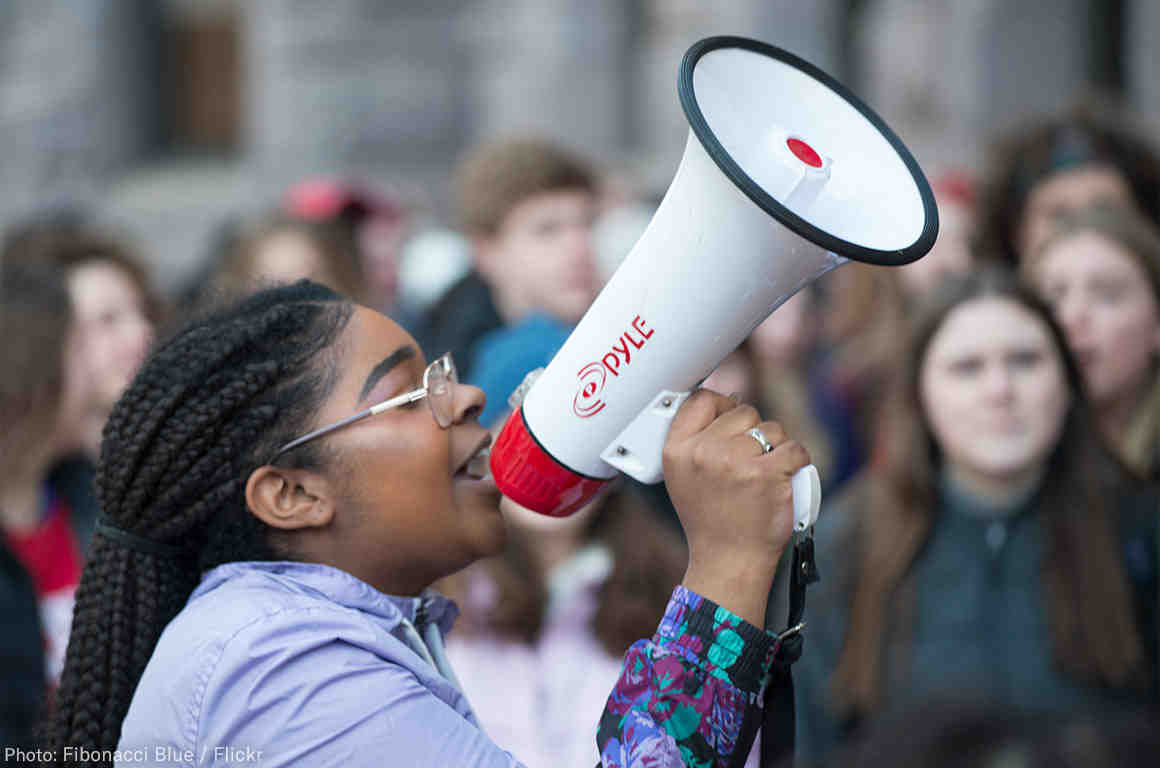Over the past several weeks, the students of Marjory Stoneman Douglas High School have seized the national spotlight and joined a proud tradition of student-led protest movements. From the Civil Rights Movement to Black Lives Matter, students across the country and here in Indiana have raised their voices to challenge the status quo and dismantle systems of oppression.
On May 8, 1968, the day before Indiana University’s famed Little 500 bike race was scheduled to be held, a group of 50 black students barricaded themselves inside the stadium for three days to protest racially discriminatory clauses in the charters of fraternities on campus. The Little 500 sit-in resulted in all but one of the participating Greek houses complying with the students’ demands and changing their charters.
Today a new generation of students, galvanized by the horrific tragedy of seeing their peers gunned down in Parkland, Florida, are raising their voices in protest and pressuring public officials to act. Students here in Indiana plan to join students across the country for a nationwide walk-out on March 14 and a March For Our Lives in Washington, DC on March 24.
As an organization that works to harness the power of grassroots activism to affect positive change, the ACLU of Indiana is inspired by these courageous young people and committed to protecting their rights.
We are heartened to see school districts in the Indianapolis area working constructively with student leaders to ensure students have an opportunity to make their voices heard – without punishment or repercussions.
But with reports of public schools in other states threatening disciplinary action against student protesters, it’s important that school administrators, parents and students understand the rights guaranteed to all Americans – including students – under the First Amendment.
Here are five things to know about students’ rights to protest in public schools.
- Students do not lose their constitutional rights at the schoolhouse gate. In America, students do not lose their constitutional rights “at the schoolhouse gate.” Students have the right to speak out, distribute flyers and petitions, and wear clothing that expresses a viewpoint — as long as they don’t disrupt the functioning of the school or violate school policies.
- Public school policies must be content-neutral. Public schools can establish general rules and policies that are unrelated to the specific opinion being expressed. So, for example, a school can establish a dress code that prohibits students from wearing hats — because that rule is not based on what the hats say — but it cannot prohibit them from wearing pro-NRA hats or ACLU hats.
- Public schools can discipline students for missing class – but they can’t punish student protesters more harshly than they otherwise would. The law in most places requires students to go to school, so schools can discipline students for missing class. But what schools can’t do is discipline students more harshly because of the political nature of or the message behind their action. Students participating in a walk-out to protest gun violence cannot be treated differently than if they were missing class for some other reason. School policies vary, so find out the rules for your school and district and ask how school administrators plan to apply them.
- School administrators: just because schools are within their rights to discipline students, that doesn’t mean they should. We commend the school leaders who are working to ensure that students can participate in these protests and make their voices heard without risking punishment, even if walk-out participants may be in technical violation of school rules. To cultivate informed citizens who care about their communities and speak truth to power, school leaders should take this opportunity to encourage this spirit of activism and civic purpose, not punish it.
- Students are allowed to speak freely on social media. Students’ right to free speech extends to social media content that is unrelated to school and posted off-campus outside of school hours.
Student-led protests are an American tradition, and the students leading the #NeverAgain movement are no exception. All of us are beneficiaries of the student-led protest movements of the past, and that means we have a shared responsibility to cultivate the next generation of freedom fighters and trailblazers who will help create a more just and equitable future.
The students of Parkland are giving the rest of the world lesson in the power of activism. We should listen.
